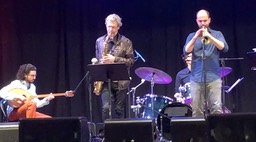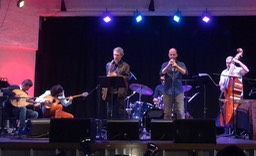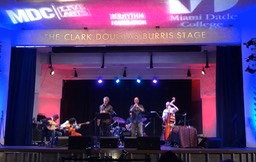Concluding a pre-concert interview, Iraqi-American composer, Amir ElSaffar, asserted, “I don’t feel like I’m an ambassador for the Islamic world. With the music, it’s just, ‘This is me,’ and I don’t need to say any more.”
During his March 3, 2018, performance, ElSaffar and his Two Rivers Ensemble brought a multi-generational audience through a range of emotions while delivering the cross-cultural greeting that characterizes Miami’s Rhythm Foundation and Miami-Dade College’s Live Arts joint programming for this season.
An extended freestyle drum solo settled the crowd and opened “Out of the Ashes,” a composition from the band’s album “Crisis.” This first of ElSaffar and Ole Mathison’s trumpet-sax duos emerged as a slow wail, reminiscent of the mid-60s Ayler Brothers, but delivered with the distinctive orchestration that reflects ElSaffar’s family heritage and artistic path.
Trumpeters Miles Davis, Clifford Brown and Freddie Hubbard were, in fact, heroes of the band leader’s youth, along with saxophonist Charlie Parker and pianist/composer Thelonius Monk. Classical trumpet and European orchestral music study in Chicago were followed by three formative years of assorted jazz gigs in New York.In 2,000, money from a trumpet prize funded travel to the Middle East and initiated ElSaffar’s years-long immersion in the traditions of the Iraqi maqam musical system, for which he temporarily gave up the trumpet in favor of studying traditional voice and satur (hammer dulcimer).
El Saffar’s bandmates, who have performed with him in such notable venues as the Newport Jazz Festival and JAZZAHEAD, share personal roots or extensive study of Middle Eastern styles, combined with “free jazz” attitudes. Their musicianship was impeccable, and they combined command of the material with eagerness to challenge themselves. El Saffar didn’t dominate center stage – generously sharing the spotlight.
Interludes of call and response between trumpet and saxophone reprised the jazz and blues configurations that ElSaffar learned in his youth. In maqam mode, which he has fully absorbed and gracefully integrated, prescribed scale patterns formed interlocking structures, then gave way to improvisations, in which the musicians wove imaginative flights and masterful flourishes.
The emotional dynamics of ElSaffar’s compositions echoed those of Iraq’s history, which the composer briefly cited. The program included passages featuring alternately languid and frenzied oud – buzuq pairings. The satur contributed harpsichord-like string tones, delivered with rapid percussive mallet strikes.
ElSaffar’s sinuous vocal melodies featured close intervals and tremulous qualities that – depending upon one’s prior experiences – sound familiar or “exotic.” The nearly continuous microtone scales of maqam music resemble those of a fretless string instrument (like the oud). To achieve them on the trumpet, ElSaffar painstakingly devised a variety of challenging techniques that he is still perfecting.
From time to time, strident horns and a driving rhythm section of drum kit and acoustic bass were unexpectedly reinforced by the oud’s rapidly strummed harmonies or complemented with insistent melodic leads on the buzuq.
One composition was named for the composer’s flight over the terrain where his grandparents are buried. Short repeated unison phrases of trumpet and sax built up emotional tension. Then, following an energetic solo, bass player Carlo DeRosa traded a series of dramatic octave jumps with ElSaffar's trumpet.
A Sufi poem lamenting the departure of a loved one inspired a composition that began with a lilting pairing of horns and ouds. Melancholic vocals evoked the saudade of Portuguese- Brazilian fado songs, while delicately blending with the satur to create a unique sound. In a felicitous and repeated combination, the satur resonated bell-like against the cymbals.Audience members new to the language of Middle Eastern music, might be challenged to distinguish among some of the compositions, but this open air performance, quietly accompanied by street sounds, children’s rustlings – and greeted with enthusiastic applause – created a gratifying East-West musical celebration.


